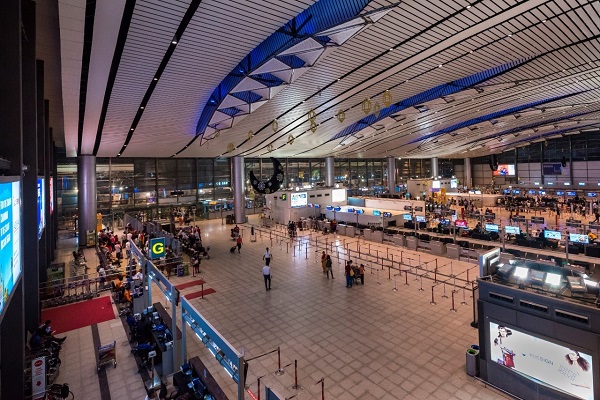Hyderabad, (Asian independent) The first phase of expansion of Rajiv Gandhi International Airport (RGIA) Hyderabad to increase its capacity to 34 million passengers per annum will go operational shortly.
Airport operator GMR Hyderabad International Airport Limited (GHIAL) stated this on Wednesday, the 14th anniversary of RGIA, the first Greenfield airport built under Public- Private Partnership(PPP)model in the country.
The airport, commissioned in 2008 in a record time of 31 months, was initially designed for 12 million Passengers Per Annum (MPPA). It has grown to serve more than 21 million passengers every year. With 6.2 MPPA in Financial 2009, the airport recorded 21.6 MPPA in FY20 with a pre-Covid 5-year CAGR of 15 per cent.
The airport had embarked on expansion in 2018 to take the overall capacity to 40 MPPA. The first phase of expansion will increase the capacity to 34 MPPA.
The airport recorded air traffic movement (ATM) of more than 81,000 in FY 09 which gradually increased to around 1,84,000 ATMs in FY 20. In FY09, the airport was connected to over 36 destinations (domestic and international). The number of destinations has now gone up to 88.
“As one of the fastest airports in India, the futuristic growth for the Hyderabad International Airport continues. To meet the rising demand of passenger traffic, the airport has embarked on a phase- wise expansion. The first phase of the expanded airport has a passenger capacity of 34 MPPA and will go operational shortly,” the operator said.
The airport, which was commissioned with air cargo handling capacity of 1,50,000 metric tonnes (MT) per annum, handled 56,700 MT per annum in FY 09 and it increased 1,12,744 MT in 2021.
“Hyderabad is known as the pharma hub of India. Keeping pace with the rising global demand of pharmaceutical products, GMR Hyderabad Air Cargo (GHAC) has seen a large volume of exports of pharma products. The pharmaceutical products now constitute 70 per cent of the total cargo exports. The share of engineering goods in total import is 50 per cent while pharma is 30 per cent so far.”
The airport operator claims that the airport initiated growth in trade and tourism, created economic drive in the region and generated a lot of business opportunities across India. The airport also spurred the growth of the city infrastructure, improved the quality of life, and unleashed the untapped potential of the city.
As per the National Council of Applied Economic Research (NCAER) Study, the Airport City’s development activities will contribute Rs 1,67,000 crore in income to the national GDP. The study also forecasts that in 2023-24, Airport City’s operations will contribute about Rs 93,000 crore in income to the national GDP and will create 56,186 jobs.
In the past, RGIA operations contributed 840,800 jobs. The total comprises 13,500 directly contributed jobs, 1,19,600 indirectly contributed jobs through supply chain (multiplier impact) and 7,07,700 jobs in induced impact through tourism and investment.
RGIA’s construction activities contributed 1,21,700 jobs during the entire construction phase. This total comprises 9,317 directly contributed jobs and 1,12,400 indirectly contributed jobs through multiplier effect.
RGIA is credited with many firsts in India. It is the first airport in India to offer an end-to-end E-boarding facility for all domestic flights and for select international flights. It is also the first airport in the country to offer an ‘Express Security Check’ facility for passengers travelling with only hand baggage, and to initiate face recognition trials. It is the only airport in the country to have all its domestic Baggage Screening machines 100 per cent compatible with the Automatic Tray Retrieval System (ATRS).
The airport also introduced India’s first-ever ‘FASTag Car Park’ in collaboration with National Payments Corporation of India (NPCI).








